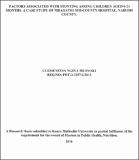| dc.description.abstract | Globally, childhood stunting is one of the most significant impediments to human development, affecting approximately 162 million children under the age of 5 years (WHA Global nutrition target, 2025). Stunting, or being too short for one's age, is defined as a height that is more than two standard deviations below the World Health Organization (WHO) child growth standards median. In Kenya, stunting rates are at 26% according to Kenya Demographic Health Survey 2014 (KDHS, 2014).The study was conducted on stunted children who visited the maternal child clinic (MCH) at Mbagathi sub-county hospital in Nairobi County. The study objectives were to investigate the social —economic and demographics variables, Child feeding and care practices and maternal feeding and care practices of the population under the study. The study adopted a across-sectional design and the sampling process was calculated using Emergency Nutrition Assessment software (ENA). The sample size included in the study was 287 children. Data was entered using the CSPro software Version 6.1 while the analysis was done using SPSS version 22. The study revealed that 80% of the households were headed by male while 82.9% of mothers interviewed were married. The mothers who had attained secondary education was at 53% and most of the families were less than five at 81.5%. Mothers who initiated breastfeeding within the first hour of life was at 87%. Exclusive breastfeeding was at 28% while complementary feeding was at 66.7%. Under health seeking behavior,97.6% of the mothers took their children for treatment to health facilities during illness .Hospital delivery was well practiced at a rate of 94.1% while ANC visits at least four times was at 39.4% with majority of the ANC visits happening within the third trimester. Extra foods during pregnancy and lactation were at 69.3% and 71.4 % respectively. The study concluded that there was inappropriate breastfeeding practices and early introduction to complementary foods as well as poor ANC attendance. Nutrition education should begin from ANC and continued at the MCH as a key recommendation. | en_US |

